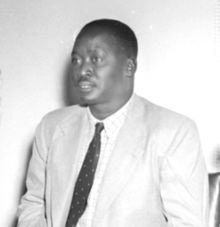Oginga Odinga
Jaramogi Ajuma Oginga Odinga (* around October 1911 in Bondo , Nyanza Province , † January 20, 1994 in Nairobi or Kisumu ) was a well-known person in the independence struggle of Kenya , first vice president and later opposition leader.
He was born in Bondo , Nyanza Province , Kenya , according to his autobiography in around October 1911. Growing up as Obadiah Adonijah , he dropped that name and became known as Oginga Odinga . He went to Maseno and Alliance High School , then studied from 1940 in Kampala , Uganda at Makerere University and later returned to Maseno High School as a teacher. In 1948 he joined a party, the Kenya African Union (KAU).
In 1960 he founded the Kenya African National Union (KANU) together with Tom Mboya . After Kenya gained independence in 1964, he became the first vice president. As Vice President, he could not agree to the growing authoritarian nature of Jomo Kenyatta's governance. He resigned from his post, left the KANU and in 1966 founded the Kenya People's Union (KPU).
Tensions between Odinga and Kenyatta continued and in 1969 Odinga was arrested after the two publicly berated each other in Kisumu , where at least 11 people were killed and dozen injured in the riot that followed. He was imprisoned for two years and then ignored until Kenyatta's death in 1978.
Under Kenyatta's successor Daniel arap Moi , Odinga remained an opponent of Kenyatta's policies, which Moi continued. He tried to form a political party in 1982, but his plans were thwarted by Attorney General Charles Njonjo , who amended the constitution making Kenya a one-party state.
After the failed coup in 1982 against the Moi government, Odinga was placed under house arrest in Kisumu.
In 1990 he tried together with others to found an opposition party, the National Democratic Party . In 1991 he founded the Forum for the Restoration of Democracy (FORD-Kenya) and became its interim chairman. The establishment of FORD triggered a series of changes that influenced Kenya's political landscape and finally - eight years after Odinga's death - led to the end of the 40-year rule of KANU.
Oginga Odinga's son Raila Odinga is now one of the leading political figures in Kenya and was a presidential candidate in the December 2007 and August 2017 elections, while his other son, Oburu Odinga, is a member of parliament .
Works
- Not Yet Uhuru, an autobiography
Web links
- East Africa Living Encyclopedia , African Studies Center, University of Pennsylvania
- Jaramogi Oginga Odinga Foundation
| personal data | |
|---|---|
| SURNAME | Odinga, Oginga |
| ALTERNATIVE NAMES | Odinga, Jaramogi Ajuma Oginga (full name); Adonijah, Obadiah (maiden name) |
| BRIEF DESCRIPTION | Kenyan politician, vice president, opposition leader |
| DATE OF BIRTH | around October 1911 |
| PLACE OF BIRTH | Bondo , Nyanza Province |
| DATE OF DEATH | January 20, 1994 |
| Place of death | unsure: Nairobi or Kisumu |
